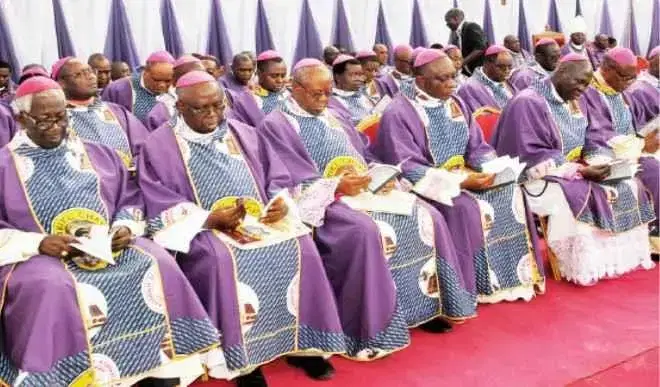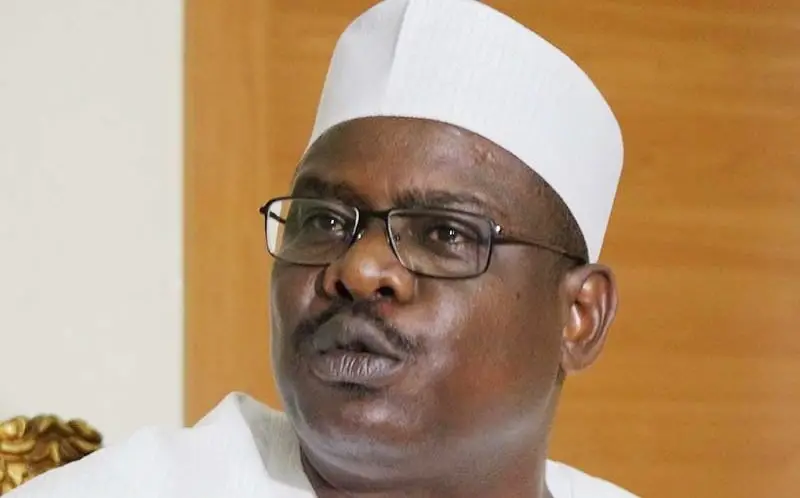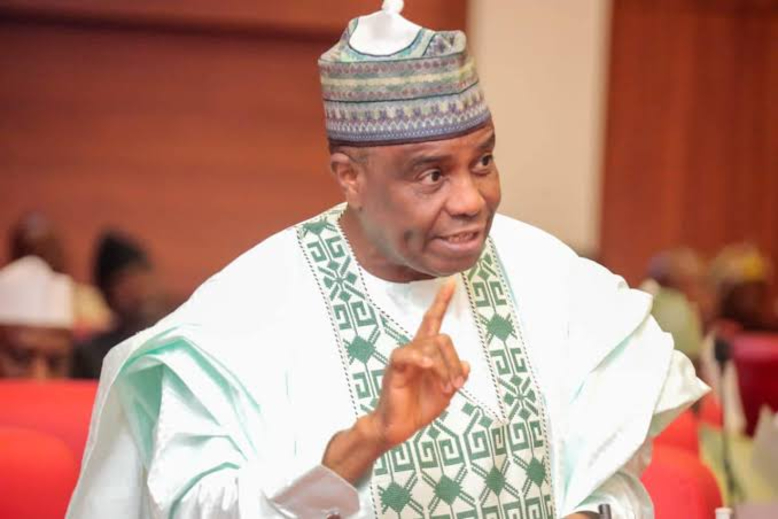News
Sharia Law Expansion Can Fuel Conflict In S’West, Catholic Church Warns

The Catholic Church has raised concerns over the potential expansion of Sharia law in Southwest Nigeria, warning that such a move could heighten religious tensions and lead to conflict in the region.
The Church has called for careful deliberation, emphasising the importance of upholding religious freedom and ensuring that no religious group is favoured over another in the region’s multi-religious environment.
This issue was highlighted during the 5th Edition of the Media Parley with the Catholic Secretariat of Nigeria (CSN) Community, held in Abuja.
The event featured key Church leaders, including Rev. Fr. Lawrence Emehel, Director of the Mission and Dialogue Department, who addressed the discussions surrounding the introduction of Sharia law.
He acknowledged the constitutional allowances for Sharia law in personal matters but urged that it be implemented cautiously to avoid disenfranchising other religious groups. He stressed that any legal reform must ensure inclusivity and respect for religious diversity in Southwest Nigeria.
The CSN official stated, “The question at hand is the introduction of Sharia law in Southwest Nigeria, and the position of the Church must be clarified first and foremost. The current desire for Sharia law stems from dissatisfaction with the existing system.
“The Church views this situation through the lens of understanding and trust. It is essential to recognise that Southwest Nigeria is a melting pot of diverse religious beliefs. Favouring one group over another could lead to conflict, especially in families with different religious traditions.
READ ALSO: Ekiti Monarch Disbands Sharia Panel, Summons Islamic Leaders
“The Catholic Church in Nigeria calls for caution—not to dismiss the legitimate desires of the people, but to acknowledge that we do not exist in isolation.
“It is crucial that the implementation of these laws does not inhibit or restrict others in their practices.
“Our identity as Nigerians is paramount, and this must not be undermined. The constitution guarantees religious liberty, but careful consideration is necessary to prevent discrimination or exclusion.”
Neo-Paganism
Another critical issue discussed at the event was the rise of neo-paganism among Nigerian youth, which the Church views as a growing challenge. Rev. Fr. Boniface Idoko, National Youth Animator, addressed the alarming trend of young Nigerians turning to pagan practices as a temporary escape from socio-economic difficulties.
He attributed this shift to a decline in family values and the overwhelming influence of social media.
The priest said, “Our youths are drawn to whatever seems to offer immediate relief or support, often leading them to pagan practices as a temporary escape from their challenges. The socio-economic environment undermines their mental stability, and old practices are resurfacing. The decline in family values has left children influenced by the streets and social media. Without proper guidance, young people are easily swayed. The Church recognises its role as a nurturing force and is organising training sessions to redirect young minds towards true faith and worship. We aim to instil values against materialism and moral neglect, and to renew hope and understanding of faith. With God’s help, we hope to reclaim our youth.”
Get-Rich-Quick Syndrome
Another key discussion point was the deepening concern over the ‘get rich quick’ mentality that has permeated Nigerian society.
READ ALSO: JUST IN: Why We Are Establishing A Sharia Panel In Oyo — Islamic Group
Rev. Fr. Michael Ayanleke Banjo, Secretary General of the CSN, linked the moral decline in the country to the glorification of unexplained wealth and the loss of ethical principles.
He stated, “To transform Nigeria and eliminate the allure of paganism and corrupt practices, we must focus on forming consciences. Without a solid foundation, people cannot differentiate between right and wrong, leading to moral apathy. The family is the cornerstone of society; if we wish to combat the ‘get rich quick’ mentality, we must instill values of honesty and contentment. We must teach children the value of hard work and dignity in labour, as these are integral to Catholic teachings. We must start with the family and extend to schools and places of worship. The responsibility is ours.”
Proposed 12-4 Education System
On reforms, Rev. Fr. Augustine Okochi, Director of the Pastoral Agents Department, spoke about necessity of the Church’s active participation in ongoing consultations with the government regarding educational reforms, particularly the proposed 12-4 education system.
Fr. Okochi reiterated the importance of ensuring that all stakeholders, including the Church, have a say in the shaping of educational policies that affect the future of Nigeria’s youth.
He said, “We recognise the importance of consulting all stakeholders before major decisions. Collaboration between the Church and government has historically been successful, and we hope to continue this partnership. We are engaged in consultations and monitoring the government’s actions in education.”
Anambra Homeland Security Law
Additionally, Fr. Michael Nsikak Umoh, National Director of the Directorate of Social Communications, touched on the Anambra Homeland Security Law, which aims to regulate religious activities, particularly those associated with indigenous and traditional practices.
READ ALSO: Lawmaker’s Islamic Bill Divides Southern, Northern Reps
Fr. Umoh acknowledged the growing misuse of religion for personal gain and exploitation. He voiced cautious support for government measures aimed at addressing these abuses, while stressing the need to protect the sanctity of genuine religious practices and prevent any overreach that might hinder the free exercise of faith.
The CSN spokesman explained, “We are all witnesses to the indecency and indiscipline prevalent in our country; religion has not been immune to this. Many individuals exploit religion for personal gain or use it for misguided purposes.
“If a government proposes measures to introduce checks and balances in this context, it aligns with one of its primary responsibilities: protecting the populace. This must be approached with great caution. We must recognise the vital role religion plays in social engineering. It contributes to the moral formation of individuals, regulates society, and helps people navigate life’s challenges.
“If a government seeks to address the wrongdoings of individuals misusing religion, such action is commendable. Nevertheless, it is imperative that we do not inadvertently discard valuable aspects of faith while addressing these issues.”
Kidnapping of Priests
Rev. Fr. Augustine Fasiku, Director of the Pastoral Affairs Department, condemned the rising incidents of kidnapping, particularly targeting priests.
READ ALSO: Man Arraigned Over Alleged Breach Of Trust
He stressed that the Church remains firm in opposing such criminal activities, which reflect the broader national problem of insecurity.
He said, “The issue of kidnapping, particularly concerning priests and other individuals in our country, has become a significant problem. Kidnapping often arises from a desperate need for financial gain. The Church has taken a firm stance against these acts, as they are not representative of our values.
“This issue transcends the Church; it is a national concern that affects us all. We must collectively address the root causes of this problem. It is not just about peace; it impacts the entire country, as many people suffer from this crisis. The Church continues to speak out against those engaging in such acts, reminding us that the teachings of the Bible call for justice and compassion.
“Therefore, it is crucial that all hands are on deck to bring an end to these heinous acts.”
The event, convened by Very Rev. Mike Umoh, concluded with a collective call to action from Church leaders to both the government and society at large, urging concerted efforts to address these pressing moral and spiritual issues.
(VANGUARD)
News
New Tax Laws: Suspend January 2026 Implementation — Senator Ndume Tells Tinubu

Former Senate Leader, Ali Ndume has appealed to President Bola Ahmed Tinubu to suspend the January 1, 2026, implementation of the country’s new tax laws amid growing controversy.
The federal lawmaker made the appeal in a statement he issued on Wednesday in Abuja.
This comes as the Nigerian Bar Association demanded the suspension of the implementation.
Recall that a member of the House of Representatives, Abdussamad Dasuki, had last week called the Parliament’s attention to alleged alteration to the tax laws.
READ ALSO:FIRS Confirms NIN As Tax ID
Chairman of the Presidential Fiscal Policy and Tax Reforms Committee, Taiwo Oyedele, in an interview on Arise Television on Wednesday, called for calm over claims of alterations in tax laws and urged Nigerians to allow lawmakers to complete their investigation before drawing conclusions.
Speaking on the ongoing controversy about the tax laws, Ndume noted that proceeding with the implementation without getting to the root of the alleged forgery will create a legitimacy challenge for the tax laws.
His statement read, “With the controversy surrounding it, the President should constitute a team to verify the veracity of the claim and act accordingly.
“As the responsive leader that he has always been, he should look at it to find out if the copy that was signed and the claim of alterations are genuine so that he will do the needful to bring the controversy to rest.
READ ALSO:US Threatens To Sanction Countries That Vote For Shipping Carbon Tax
“If not, the controversy will continue.” That is to say, the tax law will not be implemented, because you can’t build on nothing.
“So, Mr. President should suspend the implementation until the issues are resolved because so many civil society organizations, the Arewa Community, and the Nigerian Bar Association are saying that he should withdraw the tax law and investigate the allegation of forgery.”
“Therefore, Mr President should get to the root of the allegation of forgery. The small committee that will be set up should look into it while the House of Representatives does its own.”
News
Tambuwal Engages Security Agencies As US Airstrikes Hit Own LG In Sokoto

Senator Aminu Waziri Tambuwal, representing Sokoto South, has called on residents of Sokoto State to remain calm following reports of United States airstrikes targeting ISIS-linked terrorists on Christmas Day.
In a statement posted on his personal X account, the former Sokoto State governor said he was aware of reports concerning the airstrikes, which marked a direct US military action in Nigeria based on intelligence about ISWAP threats, and urged citizens to remain law-abiding while authorities clarify the situation.
“I have noted the reports concerning an airstrike carried out as part of ongoing counterterrorism efforts through cooperation between the federal government of Nigeria and the United States,” Tambuwal said. “I urge our communities to remain calm and law abiding as relevant authorities clarify the circumstances surrounding the operation.”
READ ALSO:US Dept Of War Shares Video Of Air Strikes In Nigeria
Tambuwal assured constituents that he was engaging with relevant security agencies to obtain full details of the operation and to ensure that necessary things were in place to protect civilians.
“I wish to assure the people of Sokoto South that I am in active talks with relevant security authorities to obtain full details and ensure that all necessary safeguards are upheld,” he added.
The senator emphasised that counterterrorism operations were aimed strictly at criminal and terrorist elements threatening public safety, not innocent civilians who are often victims of insecurity. He stressed that the protection of civilian lives must remain central to all legitimate security actions.
He further called on community leaders, traditional institutions and residents to work closely with security agencies by sharing credible intelligence and resisting misinformation capable of causing fear or heightening tension.
News
Rep Moore Confirms 12 Tomahawk Missiles Launched In Sokoto

No fewer than 12 Tomahawk missiles were on December 25 launched against terrorists in Sokoto State by the United States military.
Rep Riley M. Moore, the lawmaker representing Virginia’s Second District in the Congress, confirmed this in an interview with Fox News.
The US military operated in Sokoto State on Christmas night, bombing terrorists killing innocent people in parts of Nigeria.
READ ALSO:Trump’s Airstrikes: Halt Military Cooperation With US Immediately – Sheikh Gumi Tells Tinubu Govt
Some security analysts claimed on Friday that the operation was unsuccessful and had no significant impacts on the targeted terrorists.
According to them, the airstrikes landed in safe places including farms where there was no history of terrorists’ hideout.
But details began to emerge on Friday night, indicating that several terrorists were killed during the joint operations between the US army and it’s Nigerian counterpart.
READ ALSO:Nigerian Ringleader Of Nationwide Bank Fraud, Money Laundering Jailed In US, Says FBI
Moore said: “This year, thanks to President Trump, Radical Islamic Terrorists were on the receiving end of 12 Tomahawk missiles as a present.
“The successful strikes on ISIS, in coordination with the Nigerian government, is just the first step to secure the country and end the slaughter of our brothers and sisters in Christ”.
DAILY POST reports that residents of Sokoto State have been panicking since the US military operation.

 News4 days ago
News4 days agoUBTH CMD Marks 120 Days In Office, Expresses Commitment To Providing Conducive Working Environment

 News5 days ago
News5 days agoFIRS Confirms NIN As Tax ID

 Metro4 days ago
Metro4 days agoFintiri Pardons Man Sentenced To Death For ‘Killing Herdsman In Self-defence’, Others

 News3 days ago
News3 days agoJUST IN: Kano Lawmaker, Sarki Aliyu Daneji, Dies Hours After Colleague’s Passing

 News5 days ago
News5 days agoOPINION: My Man Of The Season

 News3 days ago
News3 days agoFULL LIST: Churches That Don’t Celebrate Christmas

 News5 days ago
News5 days agoKWAM 1 Withdraws From Awujale Race, Ends Court Challenge

 Metro4 days ago
Metro4 days agoPetrol Tanker Crashes Into Akpabio’s Convoy, Kills Police Dispatch Rider

 Headline2 days ago
Headline2 days agoJUST IN: US Forces Bomb Terrorists Camps In Nigeria

 News2 days ago
News2 days agoOkpebholo Slams ₦25bn Libel Suit On Edo PDP Chairman






















